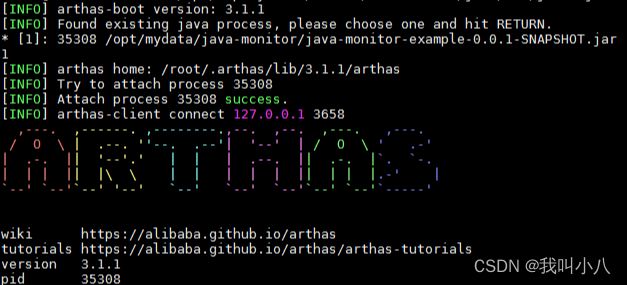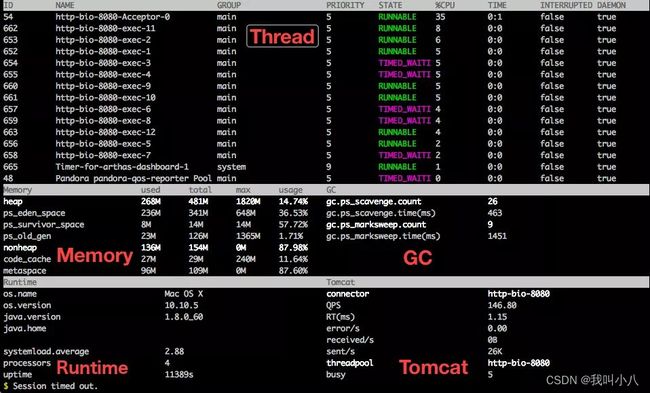阿里诊断工具arthas的使用
引言
它是阿里开源的Java诊断工具,进一步简化了动态追踪技术,有了它,可以直接查看类加载信息、JVM信息、线程堆栈信息、追踪方法执行情况,反编译类文件等,基本涵盖了前面提到的java命令行工具的功能和 BTrace的功能。无需太多额外工作,只需熟悉 Arthas提供的命令即可,很方便。其实 Arthas底层跟 BTrace一样,是基于 jvmAgent方式,使用 Instrumentation方式修改字节码方式然后执行、输出。本文将对 Arthas的使用进行介绍,鉴于官方文档已经写得很详细,建议大家直接阅读官方文档来学习,本文只作抛砖引玉便可。官网地址:https://alibaba.github.io/arthas
Arthas安装与运行
下载Arthas
官方推荐直接下载jar运行
wget https://alibaba.github.io/arthas/arthas-boot.jar
运行Arthas
把下载好的 arthas-boot.jar包放到想要监测的java应用所在服务器,跟 SpringBoot应用一样,直接使用java命令运行即可。
java -jar arthas-boot.jar
注意:
- 第一次运行,下载慢可以使用 --repo-mirror aliyun–use-http
- 启动后,会列出当前的java应用列表(有点像 jps-l),输出序号选择想要监测的应用即可。
启动后即进行 Arthas的命令行界面,可以使用 Arthas提供的命令来实现需要监测的功能。如下图,需要监测的java应用是示例 java-monitor-example。

退出
如果只是退出当前的连接,可以用 quit或者 exit命令。Attach到目标进程上的arthas还会继续运行,端口会保持开放,下次连接时可以直接连接上。
如果想完全退出arthas,可以执行 shutdown命令。
Arthas使用
Arthas的使用就是需要学会使用它提供的命令功能,主要分为几大类:
- 基本命令: help、 cat、 pwd、 history, quit等等,跟linux的命令差不多。
- jvm相关: dashboard、 thread、 jvm、 sysenv等等,主要是对JVM信息的监测,跟之前学习java命令行工具 jinfo、 jmap、 jstack等有异曲同工之妙。
- class/classloader相关: sc、 sm、 jad、 dump、 classloader等等。
- monitor/watch/trace相关: monitor、 watch、 trace、 stack等等,这些功能基本涵盖了 BTrace中所实现的功能,包括定时检测,方法参数,返回值,调用时长等。
下面对常用的几个命令进行说明,详细的命令列表请查阅官方文档。
概览: dashboard
启动 Arthas后, -h查看使用帮助:
$ dashboard -h
USAGE:
dashboard [-b] [-h] [-i ] [-n ]
SUMMARY:
Overview of target jvm's thread, memory, gc, vm, tomcat info.
EXAMPLES:
dashboard
dashboard -n 10
dashboard -i 2000
相当于概览,在一个界面中显示线程、内存、gc情况,vm情况和tomcat信息。如下图(官方文档的示例图):

这个概览的信息默认5秒刷新一次,对于内存变化,线程占用情况,GC次数,一目了然。使用 ctrl+c退出。
线程信息: thread
还记得 jstack吗,我们需要先找出线程ID,使用它导出线程堆栈,然后使用线程ID查看。在 Arthas中就方便多了,像上面 dashboard中,已经有ID,直接使用 thread id即可。-h查看帮助文档:
$ thread -h
USAGE:
thread [-h] [-b] [-i ] [-n ] [id]
SUMMARY:
Display thread info, thread stack
EXAMPLES:
thread
thread 51
thread -n -1
thread -n 5
thread -b
thread -i 2000
OPTIONS:
-h, --help this help
-b, --include-blocking-thread Find the thread who is holding a lock that blocks the most number of threads.
-i, --sample-interval Specify the sampling interval (in ms) when calculating cpu usage.
-n, --top-n-threads The number of thread(s) to show, ordered by cpu utilization, -1 to show all.
Show thread stack
如上面所示的 EXAMPLES,使用 thread命令,可以找出占用CPU最高前N个线程( -n),可以打印指定线程的运行堆栈( id),找出当前阻塞其他线程的线程( -b),由此来分析线程问题很方便。
JVM信息: jvm
jvm命令很简单,没有参数,它输出的信息包括运行参数,类加载信息, 内存情况,系统信息,线程数信息,文件描述符等。有点像 jvisualvm的中 概述,但比它更详细。
反编译: jad
有时需要检测线上运行的应用中,新的代码是否有使用或者是否有更新到,可以把加载的类反编译出来,查看源码是否为最新的,这时 jad就很有用。-h打印使用帮助:
$ jad -h
USAGE:
jad [-c ] [-h] [-E] [--source-only] class-pattern [method-name]
EXAMPLES:
jad java.lang.String
jad java.lang.String toString
jad --source-only java.lang.String
jad -c 39eb305e org/apache/log4j/Logger
jad -c 39eb305e -E org\\.apache\\.*\\.StringUtils
OPTIONS:
-c, --code The hash code of the special class's classLoader
-h, --help this help
-E, --regex Enable regular expression to match (wildcard matching by default)
--source-only Output source code only
Class name pattern, use either '.' or '/' as separator
method name pattern, decompile a specific method instead of the whole class
如上面所示的 EXAMPLES,jad可以反编译类( class-pattern),反编译类的某个方法( method-name),如果有多个 classLoader,还可以使用 -c来选择显示哪个等。
方法执行监控: monitor
monitor可以定时输出方法的执行情况进行监控,包括调用次数,成功次数,失败次数,平均时长,失败率等,有点像 BTrace中的 @Timer,但是更方便。-h查看使用帮助:
$ monitor -h
USAGE:
monitor [-c ] [-h] [-n ] [-E] class-pattern method-pattern
SUMMARY:
Monitor method execution statistics, e.g. total/success/failure count, average rt, fail rate, etc.
Examples:
monitor org.apache.commons.lang.StringUtils isBlank
monitor org.apache.commons.lang.StringUtils isBlank -c 5
monitor -E org\.apache\.commons\.lang\.StringUtils isBlank
OPTIONS:
-c, --cycle The monitor interval (in seconds), 60 seconds by default
-h, --help this help
-n, --limits Threshold of execution times
-E, --regex Enable regular expression to match (wildcard matching by default)
Path and classname of Pattern Matching
Method of Pattern Matching
如上面所示的 EXAMPLES,可以监测方法执行情况,默认是60s输出一次,可以使用 -c来修改输出间隔时间。
方法执行数据监测: watch
类似于 BTrace的 @OnMethod,若想在线上的应用中把执行方法时的参数,返回值,异常信息, watch命令就非常合适。-h使用帮助:
$ watch -h
USAGE:
watch [-b] [-e] [-x ] [-f] [-h] [-n ] [-E] [-M ] [-s] class-pattern method-pattern express [condition-express]
SUMMARY:
Display the input/output parameter, return object, and thrown exception of specified method invocation
The express may be one of the following expression (evaluated dynamically):
target : the object
clazz : the object's class
method : the constructor or method
params : the parameters array of method
params[0..n] : the element of parameters array
returnObj : the returned object of method
throwExp : the throw exception of method
isReturn : the method ended by return
isThrow : the method ended by throwing exception
#cost : the execution time in ms of method invocation
Examples:
watch -b org.apache.commons.lang.StringUtils isBlank params
watch -f org.apache.commons.lang.StringUtils isBlank returnObj
watch org.apache.commons.lang.StringUtils isBlank '{params, target, returnObj}' -x 2
watch -bf *StringUtils isBlank params
watch *StringUtils isBlank params[0]
watch *StringUtils isBlank params[0] params[0].length==1
watch *StringUtils isBlank params '#cost>100'
watch -E -b org\.apache\.commons\.lang\.StringUtils isBlank params[0]
OPTIONS:
-b, --before Watch before invocation
-e, --exception Watch after throw exception
-x, --expand Expand level of object (1 by default)
-f, --finish Watch after invocation, enable by default
-h, --help this help
-n, --limits Threshold of execution times
-E, --regex Enable regular expression to match (wildcard matching by default)
-M, --sizeLimit Upper size limit in bytes for the result (10 * 1024 * 1024 by default)
-s, --success Watch after successful invocation
The full qualified class name you want to watch
The method name you want to watch
the content you want to watch, written by ognl.
Examples:
params
params[0]
'params[0]+params[1]'
'{params[0], target, returnObj}'
returnObj
throwExp
target
clazz
method
如上面所示的 EXAMPLES,监测时机分别是方法执行前( -b),方法执行结束( -f,默认值),方法执行成功( -s)。监测内容包括:参数( params),返回值( returnObj),异常( throwExp)等。
总结
Arthas的强大功能,基本可以对java应用进行全面的监测,是线上应用监测的好帮手,本文相对比较简单地对 Arthas的安装和使用进行入门讲解,抛砖引玉,希望大家能上 Arthas官方网站进一步学习,里面已经对各命令都有详细的讲解和示例,从而让自己的java监测技术更扎实。